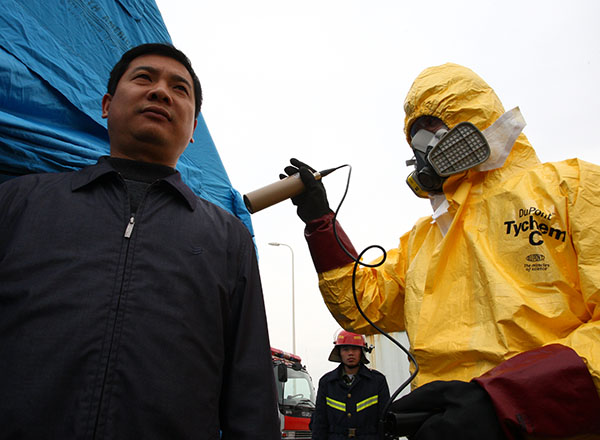China's nuclear emergency preparedness
(China Daily) Updated: 2016-01-28 08:27
 |
|
A nuclear leakage emergency drill is held in Zhuhai, south China's Guangdong province on March 11, 2013. [Photo/CFP] |
Following is the full text of China's Nuclear Emergency Preparedness published by the State Council Information Office of the People's Republic of China in January 2016.
Preface
I.Current Situation of Nuclear Energy Development and Nuclear Emergency Preparedness
II.Guidelines and Policies for Nuclear Emergency Preparedness
III.All-round Promotion of Nuclear Emergency Preparedness
IV.Building and Maintenance of Nuclear Emergency Capabilities
V.Main Measures to Cope with Nuclear Accidents
VI.Nuclear Emergency Preparedness Exercises, Drills, Training and Public Communication
VII.Scientific and Technological Innovations in Nuclear Emergency Preparedness
VIII.International Cooperation and Exchanges in the Field of Nuclear Emergency Preparedness
Conclusion
Preface
The discovery of the atom and the subsequent development and utilization of nuclear energy gave a new impetus to the progress of humanity and greatly enhanced mankind's ability to understand and shape the world. Yet, the development of nuclear energy has associated risks and challenges. For mankind to better utilize nuclear energy and achieve even greater progress, it is necessary to make innovations in nuclear technologies, ensure nuclear safety and do well in nuclear emergency preparedness. While nuclear safety constitutes a lifeline for the sustained and healthy development of nuclear energy, nuclear emergency preparedness serves as an important safeguard for its sustained and healthy development.
Nuclear emergency preparedness denotes the emergency actions taken to control, contain and mitigate a nuclear accident, and to minimize the consequences of such accidents, which are different from the normal order and working procedure. They are emergency response actions guided by the government, assisted by the relevant enterprises, coordinated among all the involved parties and implemented in a unified manner. Nuclear emergency preparedness is of paramount importance and bears on the overall situation, and is therefore of critical significance to the protection of the general public, the environment and social stability as well as safeguarding national security.
China has consistently given top priority to nuclear safety in its peaceful use of nuclear energy, and has persisted in an overall national security concept by advocating a rational, coordinated and balanced nuclear safety outlook. China has followed the approach of enhancing safety for the sake of development and promoting development by upholding safety in an unrelenting effort to bring the dual goals of development and safety in alignment with each other. In the past six decades or so, the Chinese people have been working with stamina and diligence in the pursuit of nuclear energy utilization, with splendid achievements. At the same time, the Chinese people have been sparing no effort to improve nuclear safety techniques, enforce rigorous nuclear safety supervision, strengthen nuclear emergency management and ensure that nuclear energy has always maintained a sound safety record.
Nuclear accidents know no national boundaries, and everything related to nuclear emergency management is too important to be taken lightly. Drawing on the lessons learned from the Three Mile Island, Chernobyl and Fukushima nuclear accidents, China has come to a profound understanding of the utmost importance of nuclear emergencies, and the need to continuously strengthen and improve nuclear emergency preparedness and responses with a view to constantly enhancing the nuclear safety safeguard level. China has made great strides in a full range of nuclear emergency-related activities, including the enactment of regulations, codes and standards, the establishment of institutional and regulatory regimes, the building-up of basic capabilities, the fostering of professional personnel, related exercises and drills, public communication, and international cooperation and exchanges. This has not only provided a robust safeguard for China's own nuclear energy development, but also contributed actively to the promotion of a fair, open, collaborative and mutually beneficial international nuclear safety emergency framework and mankind's sharing of nuclear energy development achievements.

I’ve lived in China for quite a considerable time including my graduate school years, travelled and worked in a few cities and still choose my destination taking into consideration the density of smog or PM2.5 particulate matter in the region.











